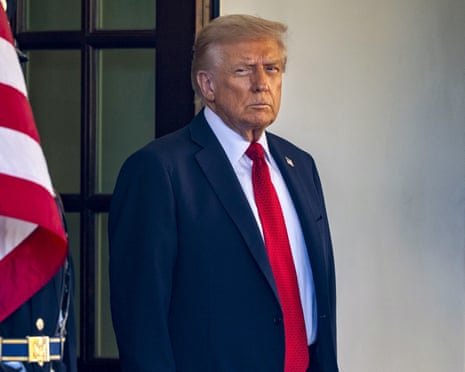
UK Faces Growing Echoes of Trump-Style Politics Amid Domestic Shifts and Populist Surge
Analysis suggests Britain’s political landscape is increasingly mirroring aspects of the United States under Donald Trump, though the government resists the comparison
Since the start of Donald Trump’s second presidential term in the United States, a range of analysts and political figures in the United Kingdom are warning that Britain could be following a similar trajectory in terms of populist rhetoric, institutional strain and electoral realignment.
The parallels are emerging at a moment of broad social turbulence and electoral unpredictability across the Western democracies.
At one level, British intelligence voices are blunt.
MI5 director-general declared that Chinese state actors present a “national-security threat every day,” signaling the kind of existential framing of foreign policy that has become familiar in Washington under Trump.
At another level, the governing side in London is portraying relations with China as economically vital but strategically delicate—another echo of Trump-era U.S. diplomacy.
Domestic political developments in Britain further underscore the drift.
The right-wing populist party Reform UK, led by Nigel Farage, is openly drawing inspiration from Trump’s movement, with commentators identifying links in style, substance and donor networks.
The Liberal Democrats have explicitly warned that Britain could become “Trump’s America” should the Reform agenda gain traction.
Meanwhile, immigration policy and cultural-war framing in parliamentary discourse are shifting markedly: new data show heightened securitisation and migration control narratives reminiscent of U.S. dialogue under Trump.
On the foreign-policy and economic front, Britain’s government has attempted to forge a balance by calling China a “geostrategic challenge” while emphasising the country’s importance as a trading partner—recalling the dual-track posture seen in Washington post-2021. At the same time, landmark decisions such as replacing the international aid budget with increased defence spending have triggered comparisons with Trump-style prioritisation of national security over traditional multilateral obligations.
Yet there are limits to the analogy.
For one, Britain’s institutions—its legal systems, party structures and civil service—remain intact and functional, unlike some U.S. debates about executive overreach.
Additionally, the Labour government under Keir Starmer is not aligned with populist conservatism; rather it is trying to adapt to rising right-wing alternatives by adopting tougher stances on immigration and defence, but without abandoning prevailing democratic norms.
Whether Britain ultimately follows the United States into a fully Trump-style political model is far from certain.
But the signs are clear: the combination of populist campaigning, cultural-division framing, immigration securitisation and strategic diplomacy are converging into a pattern that bears resemblance to the U.S. phenomenon.
And the window for Britain to calibrate its path before such tendencies become deeply embedded appears to be narrowing.
As Britain enters an electoral cycle that could reshape its politics for a generation, the question is not simply whether it will emulate Trump’s America—but whether it will chart a distinct course or become a copy of it.
The parallels are emerging at a moment of broad social turbulence and electoral unpredictability across the Western democracies.
At one level, British intelligence voices are blunt.
MI5 director-general declared that Chinese state actors present a “national-security threat every day,” signaling the kind of existential framing of foreign policy that has become familiar in Washington under Trump.
At another level, the governing side in London is portraying relations with China as economically vital but strategically delicate—another echo of Trump-era U.S. diplomacy.
Domestic political developments in Britain further underscore the drift.
The right-wing populist party Reform UK, led by Nigel Farage, is openly drawing inspiration from Trump’s movement, with commentators identifying links in style, substance and donor networks.
The Liberal Democrats have explicitly warned that Britain could become “Trump’s America” should the Reform agenda gain traction.
Meanwhile, immigration policy and cultural-war framing in parliamentary discourse are shifting markedly: new data show heightened securitisation and migration control narratives reminiscent of U.S. dialogue under Trump.
On the foreign-policy and economic front, Britain’s government has attempted to forge a balance by calling China a “geostrategic challenge” while emphasising the country’s importance as a trading partner—recalling the dual-track posture seen in Washington post-2021. At the same time, landmark decisions such as replacing the international aid budget with increased defence spending have triggered comparisons with Trump-style prioritisation of national security over traditional multilateral obligations.
Yet there are limits to the analogy.
For one, Britain’s institutions—its legal systems, party structures and civil service—remain intact and functional, unlike some U.S. debates about executive overreach.
Additionally, the Labour government under Keir Starmer is not aligned with populist conservatism; rather it is trying to adapt to rising right-wing alternatives by adopting tougher stances on immigration and defence, but without abandoning prevailing democratic norms.
Whether Britain ultimately follows the United States into a fully Trump-style political model is far from certain.
But the signs are clear: the combination of populist campaigning, cultural-division framing, immigration securitisation and strategic diplomacy are converging into a pattern that bears resemblance to the U.S. phenomenon.
And the window for Britain to calibrate its path before such tendencies become deeply embedded appears to be narrowing.
As Britain enters an electoral cycle that could reshape its politics for a generation, the question is not simply whether it will emulate Trump’s America—but whether it will chart a distinct course or become a copy of it.










